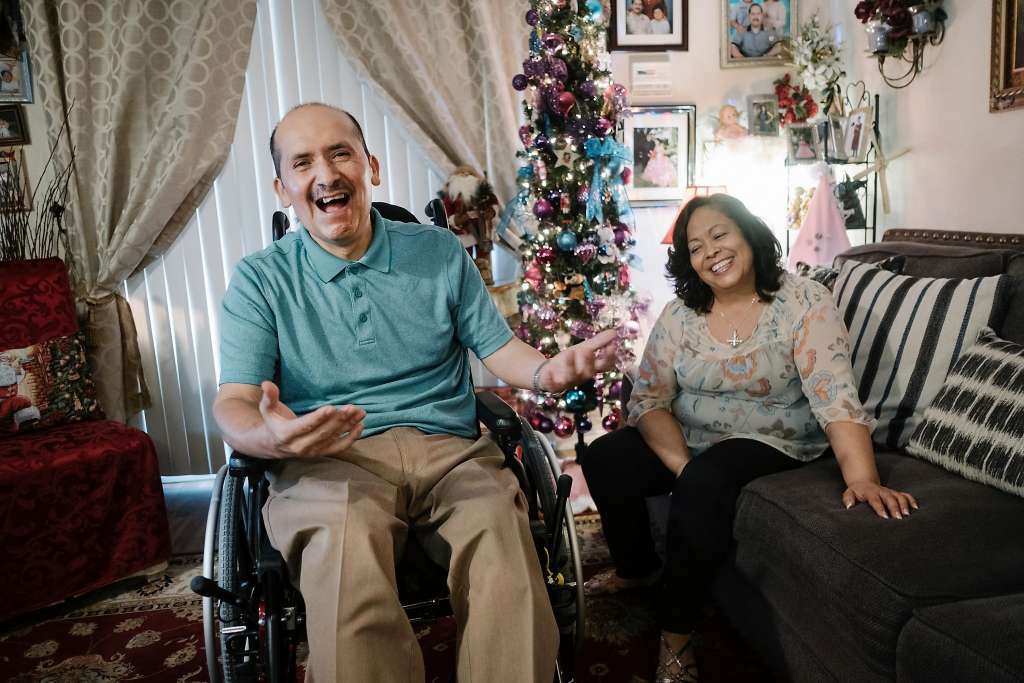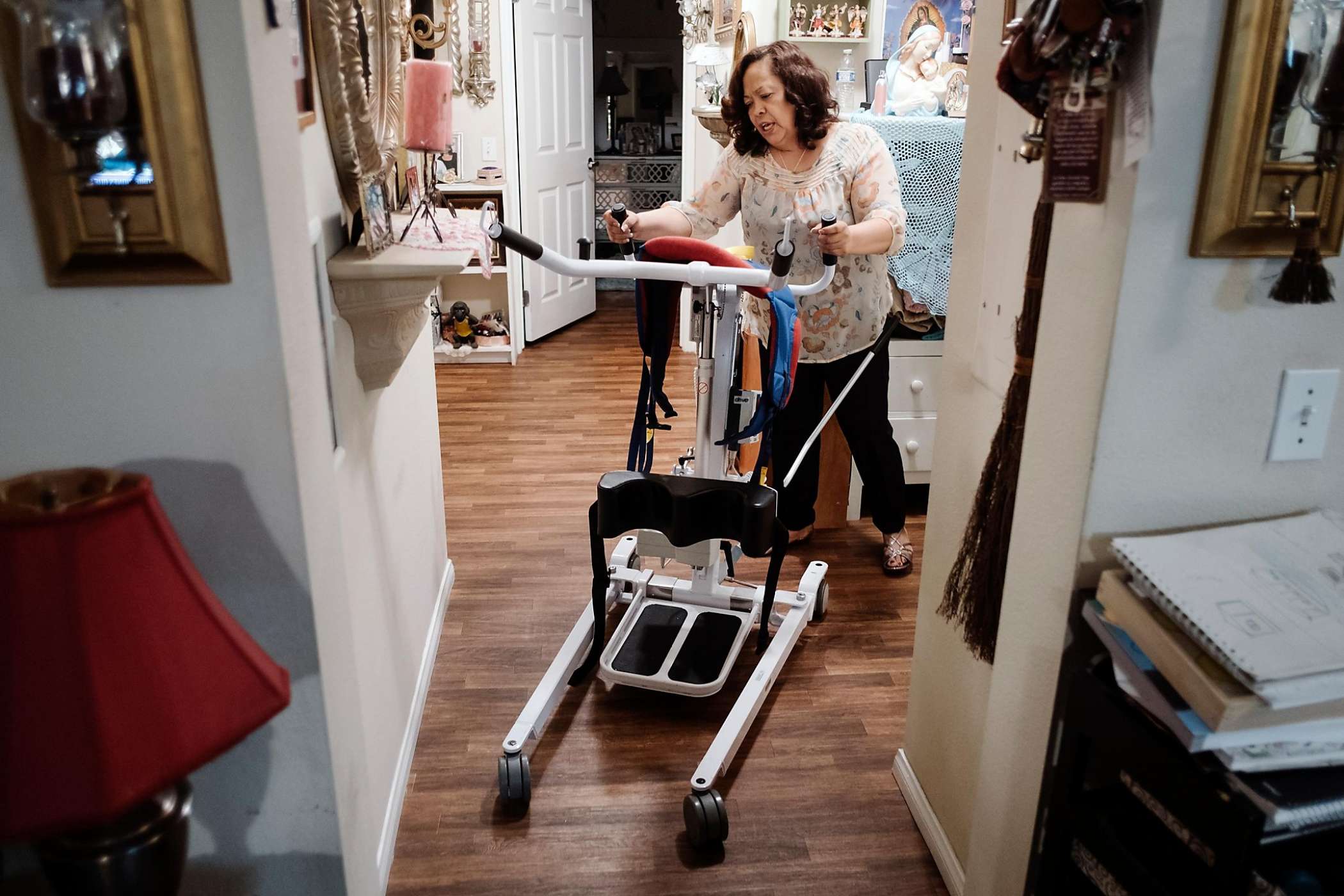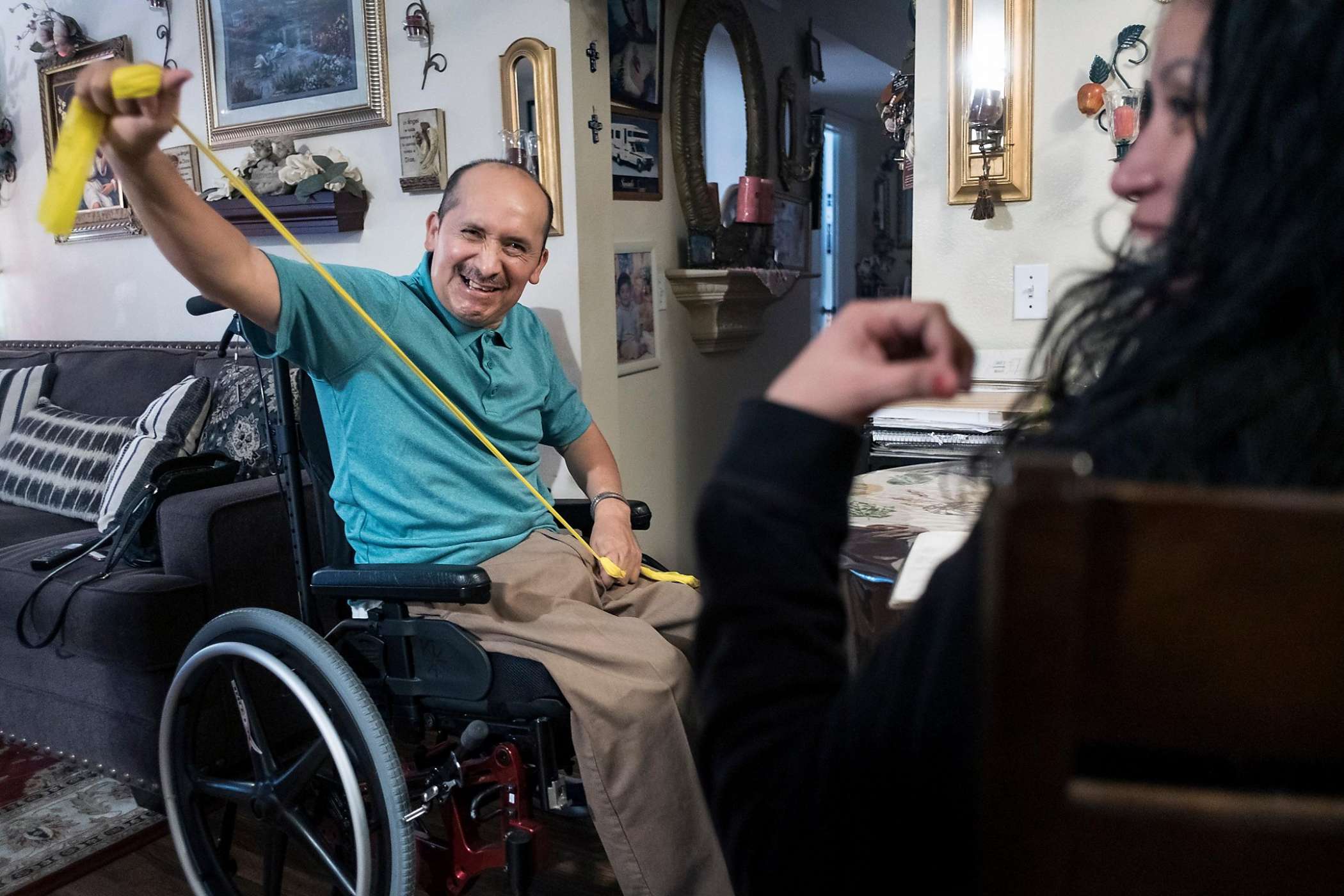
Many years ago, when his body was strong and the paychecks flowed, Jose Rios-Estrada built cabinets. He shaped oak and mahogany with his saws and hammers, and the shelves and doors he created went into camper vans and wineries all around the Napa Valley.
Rios’ hands were sure, and he had a wife who loved him, a baby boy and a house. But that was many years ago.
The end to the cabinetmaking started small, like so many sad things. Then it grew to monstrous proportions that at times seemed like too much to bear. But in that challenge came strength, new life, greater faith — and a deeper understanding that sometimes, when you’ve just about given up, help can come from places where you’d never expect it.
The trouble began one day in 1995 when Rios woke up with double vision. That went away after a few days. Then there was a bit of dizziness — which by the end of the year became a lot of dizziness, so much that he could barely walk. And that’s when the doctors told him he had a disease he’d barely even heard of before.
It was called multiple sclerosis, and it was going to end his career, they said.
It did end his career, and in a few short years he and his family lost their house in Napa and moved into an apartment across town. But Rios and his wife, Josefina Calderon, and their son, Christian Rios, are built of strong stuff. So it didn’t end them.
“But then you get used to it. This is our life. And it is good.”
“Why be mad about what has happened?” Rios said, sitting at the dining room table recently as he carefully drew a helicopter in a sketchbook he keeps with him to keep his hands exercised to prevent them from seizing up. “There is nothing you can do, so it is God’s will.”
Calderon — who like her husband is 51 — handed him a newly sharpened pencil to fill in the finer detail of the helicopter’s rotor. He smiled up at her and patted her hand.
“In the first couple of years I didn’t want to go out, or use the wheelchair,” Rios said. “But then you get used to it. This is our life. And it is good.”
That attitude permeates their small apartment, a study in neatness and placidity. Every wall features a picture of either Jesus, Mary, an angel or members of their huge extended family. A 3-foot-tall statue of Mary stands in the hallway, with an open Bible at her feet, and on the wall, over Rios’s head, is a painting of Jesus alongside a prayer.
“I like this one a lot,” said Calderon, touching the prayer on the wall after she helped her husband into bed for a rest. She read the words — “I put my hands on you, whatever you want to do with me, I thank you” — then fell silent a moment.
“We do pray a lot,” she said quietly. “And God listens.”
One of those times God listened, she said, came not long ago when the couple was just about out of hope.


In October 2017, Rios developed an infection that landed him in hospitals and skilled nursing homes for months as a series of follow-up problems hit, from open bedsores to a seizure. It wasn’t until the following July that he was able to finally go home — but by then, he was so weakened that he couldn’t get out of bed.
Calderon couldn’t physically lift him. She suffers from carpal tunnel, dislocated spinal discs and other physical complications from the housecleaning and winery production work she did before leaving work behind in 2005 to take care of Rios. She’s able to do all the things a home health aide does — make the meals, get her husband in and out of his wheelchair and bed, and more. But she needs him to help just a bit. So when he couldn’t even sit up in his bed, she was at her wits’ end.
Their son, friends and family helped — but they couldn’t do it 24-7.
That presented a dilemma. Medi-Cal won’t pay Calderon for her home health-aide role. Nor will it supply a full-time aide so she could explore other work. So the couple lives entirely on Rios’ $1,350 monthly federal disability check and a government subsidy to help with rent.
The thing they needed most, but could not afford, was a $3,800 lifting machine to help Rios out of bed.
“That kind of money, for us, would be like buying a car. Impossible,” Calderon said. “Then we heard about the Care Network that helps people with problems like ours.”
“It’s amazing. It saved us,” said Calderon. “God and Season of Sharing answered our prayers.”
And that led to The Chronicle’s Season of Sharing, which provides one-time funds to people in need.
Calling Care Network, which helps low-income people with medical needs, put the couple in touch with the nonprofit’s social worker Maria Puentes — who contacted Season of Sharing. In two weeks, the device was at Rios’ bedside.
“It’s amazing. It saved us,” said Calderon. “God and Season of Sharing answered our prayers.”
Lately, even more good news has come their way. A few months ago, Rios got prescribed Ocrevus, a relatively new drug that helps prevent MS from worsening — and he’s responded so well that he has begun to be able to get out of bed at times without the lift. The machine is still crucial, but with Rios feeling peppier, he’s been doing more arm exercises and feels stronger.
“Jose is a very sweet guy, always a big smile on his face,” Puentes said. “And both of them — they are so upbeat. A lot of that has to do with their family support and their faith. But just on their own, their attitude is really something.”
The typical day in the Rios-Calderon household is filled with sketching, laughing, reading, and watching soccer and movies on TV. On the weekends, there is church.
Their son is 22 and in his final year of study for a degree in physical therapy at San Francisco State University. So he’s gone every day. At home, the couple occupies each other with the little things. Everyday things, which for a long-married couple that loves each other is plenty, they say. There’s not much sitting around feeling sorry about things because too much has actually gone right for them, they’ll tell you.
They both grew up poor in Mexico and immigrated to America in 1981 for a better life, and after meeting at a night-school class in English they got married. They became citizens. They worked. Rios played in a soccer league — he has a “Most Valuable Player” tournament trophy on a shelf from the 1980s — until his legs gave out.
When it’s holiday time, like now, there are sisters and brothers and parents to fill the house with chatter, children, and cheer.
“We are blessed,” Calderon said.
“And that goes extra for me,” said Rios. “I love everything about my wife — she is smart, kind and if it wasn’t for her I wouldn’t be here today.”
He pumped his fist and grinned. “Our life? No problem!” he said.
Kevin Fagan is a San Francisco Chronicle staff writer. Email: kfagan@sfchronicle.com Twitter: @KevinChron
Read the full story here: https://www.sfgate.com/bayarea/article/Multiple-sclerosis-changed-their-lives-But-this-13489627.php?utm_campaign=2017&utm_source=1stcollection&utm_medium=sfgatesospage#photo-16674639
